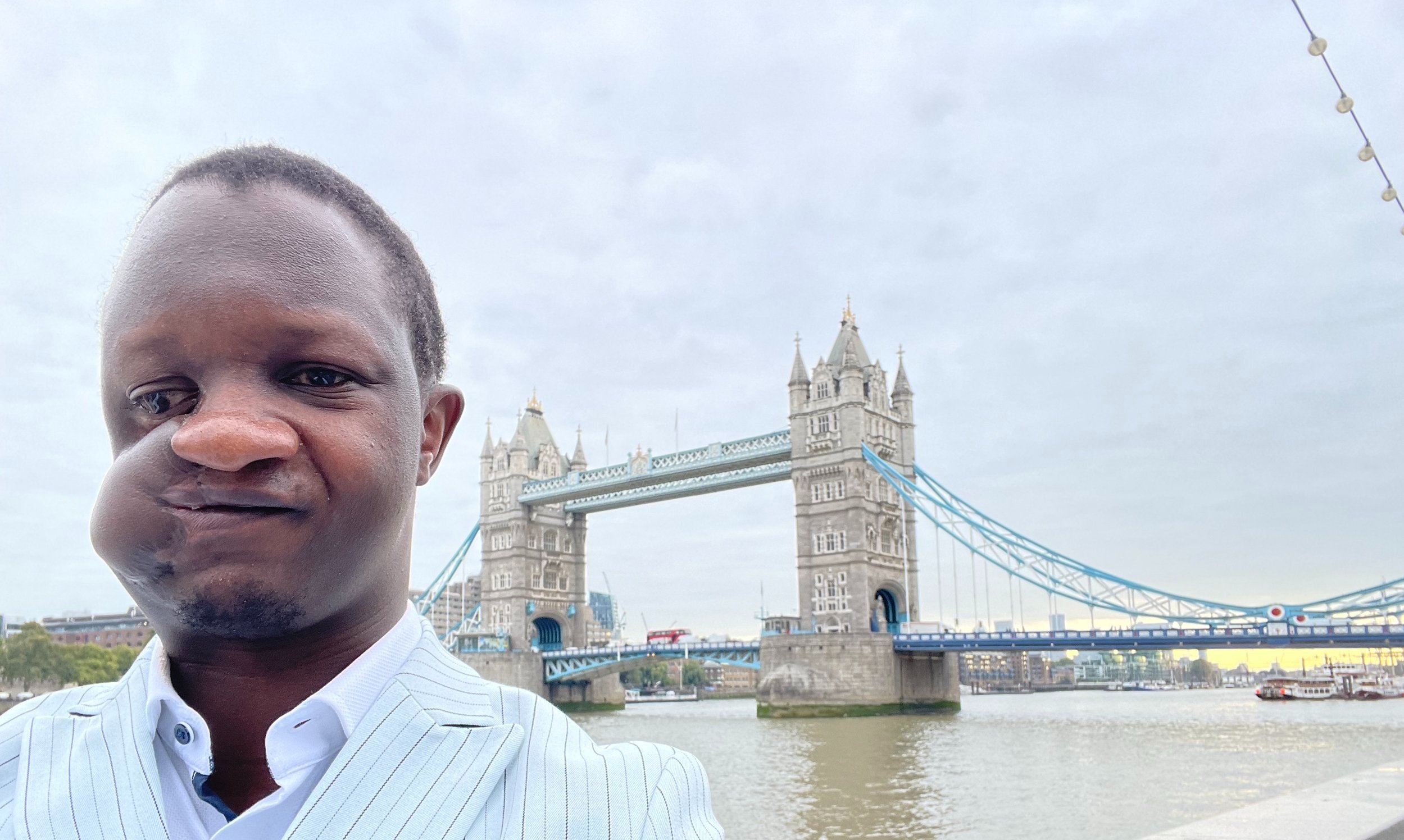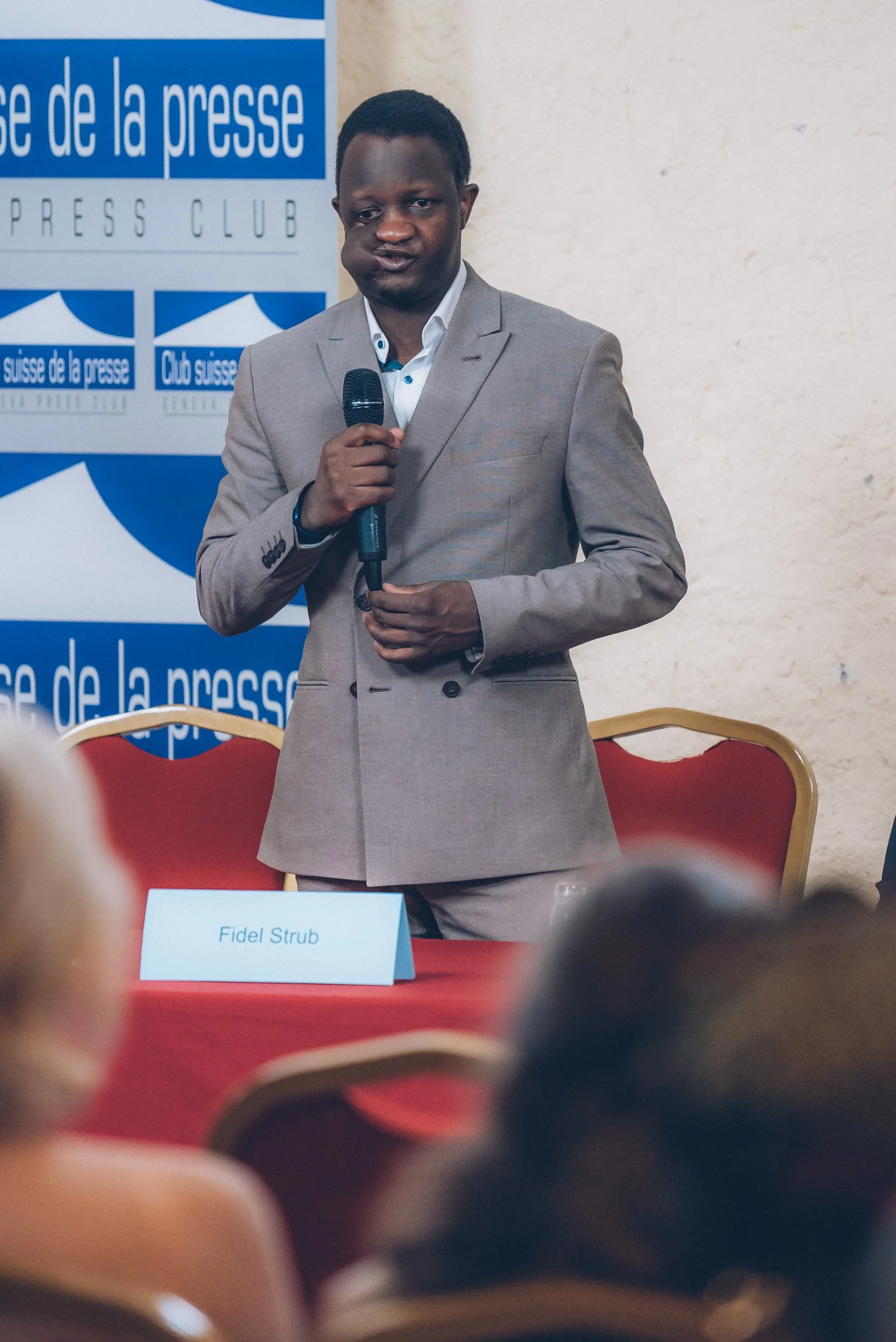
© Fidel Strub
An Interview with Fidel Strub. Noma Survivor and Advocate
Caution: This story contains sensitive material including references to suicide
Fidel Strub with the Tower Bridge of London.
Fidel Strub was born in May 1991 in Ouagadougou, Burkina Faso. In April 1994, he became sick with the life-threatening disease noma. Today at 32 years old, Fidel has undergone a total of 27 operations and is the co-founder of Elysium Noma Survivors Association founded in 2022. He is an advocate for survivors and strives to raise awareness of noma. Here is his story.
WRITTEN BY CASSANDRA COLLINS
Photo: © Fabrice Catérini / Inediz
“I fought more than four times for survival…” recalls Fidel Strub, “…where I was really on the brink of death.” At just under three years old Fidel contracted noma.
Noma is a non-contagious bacterial disease that rapidly destroys oral and facial tissues. It is a disease of poverty, primarily affecting young children suffering from malnutrition, poor living conditions and poor oral and general health. At the time, Strub was one of 9 or 10 children living in four traditional houses of wood, clay and straw that were “quite dirty,” and “just big enough for everyone to sleep comfortably” he describes. His father - a farmer, his mother - a maid, all the family’s income went to supporting Fidel’s older sister in hopes that she could provide for the family. Unfortunately, this did not happen leaving Fidel starving and struggling for survival.
Initially, Fidel felt a sharp pain in his cheek while playing outside with his brother. “Like if you bit your cheek, but it was more painful than normal, I didn’t think of a lot of it, so I ignored it,” he states. In a matter of days, Fidel’s health rapidly declined leaving him weak, with no power, no energy. His father took him to numerous doctors for help but to no avail as “noma progressed without any signs of slowing down,” Fidel continued.
Eventually, he was brought to a hospital in Ouahigouya in the north of Burkina Faso. Here, was the only doctor in the whole country that knew of noma and how to treat patients with noma. After receiving initial treatment Fidel was sent back to his parents. Strub’s father tried desperately to ensure Fidel had enough to eat and to support his treatment. In the end, Fidel’s father sold all their livestock for some money. But that still wasn’t enough. Again, Fidel was left starving.
© The Strub Household
Fidel Strub as a child prior to facial reconstruction surgery in Burkina Faso around 1994/1995.
A woman believed to be sent from the local non-governmental organization (NGO) began to care for Fidel. He remembers reading that doctors “…had to save me numerous times because I was infected or I had malaria or I had some other infection in my cheek, in my eye and problems with my ears. So, it was quite a challenge for me and for them to keep me alive,” he concluded.
Due to noma, the right side of Fidel’s face spanning from below his right eye to lower lip was left with extensive destruction of his soft tissue and bone. Once his health was stabilized, Fidel was sent to Geneva, Switzerland for his first reconstructive surgery.
Fidel recalls “…waking up with threads in my cheek and threads in my back because the cheek here is muscle from my back…It was a special case so there were students, new doctors, doctors from different departments. The room was always full, which wasn’t really pleasant for me.” To date, Fidel has undergone 27 operations.
During his time in Geneva, Fidel developed a meaningful bond with one of his doctors. She eventually adopted Fidel and he now permanently resides in Switzerland.
“With noma there is no end, the only end is death. Until then you still have to adapt and adjust.” Fidel describes that life after noma- the physical, mental, and social consequences, the healing and the recovery is lifelong.
Depending on the extent and location, physical consequences for noma survivors vary. For Fidel these limitations primarily involve his mouth. He wears a dental prosthetic appliance that replaces his upper jaw and teeth starting from his nasal cavity. He also has grafts from his back and skull to replace lost tissue and bone. This led to changes in speaking, mouth opening and chewing. It took a year to teach himself how to speak using the prosthesis, he can only open his mouth 9 mm in the summer and 4 mm in the winter, and he can only chew using his left side. His bite force is 50% less than normal.
Since noma often alters the physical appearance of survivors’ faces, survivors often deal with harsh and unkind judgements from people in society. “People stare at you. There is sometimes a juvenile who laughs at you because it’s funny how I look…” and at times the assumption is that he also has an intellectual disability. It doesn’t stop. It will not end. But as Fidel says, “you get used to it.” Strub can control himself during unpleasant interactions but admits that he is worried about the day he cannot.
“It’s a lifetime fight. The fight gets less intense the moment you accept yourself. At the moment you say ‘Okay this is my life now’. This takes in total 10-20 years.” Fidel admits struggling with his mental health and it being one of the biggest challenges. Fidel finally learned to accept himself in 2017 after his third suicide attempt.
When he was hospitalized, “there was a black doctor there who had nothing to do with my case. He came into the room and scolded me for 10 minutes straight. At first, I was a bit angry and thought ‘Why does he care?’. He said, ‘It won’t go away; you will look like this. This is it and you have to accept it and do something with it’,” Fidel reminiscences. He also had multiple friends contact him. This made Fidel realize “…that they do accept me how I am. They actually don’t see my face how I see myself. I think this made the change.” Despite accepting himself, Fidel avoids looking at his reflection.
“Surviving noma means you have a strength that you cannot compare to [anyone else].”
Fidel chooses to share his story because he wants to give hope to not only noma survivors but also to those that are struggling with mental health as “…they don’t have to do it alone. There is no shame in seeking help.” He hopes that his story inspires others and can help accelerate the recognition of noma as a Neglected Tropical Disease (NTD).
Currently Fidel is the co-founder the Elysium Noma Survivors Association alongside Mulikat Okanlawon, another survivor of noma. Their main goal is to raise awareness of noma as it remains quite unknown.
For the future, Fidel hopes that noma is recognized as an NTD, and if not, to keep fighting, keep sharing stories and to keep raising awareness about noma. He also has three main goals for the future. First, the adoption of a general health policy regarding oral care and a mandatory check for inflamed gums. The second goal is that mental health and its effects are taken more seriously. Finally, to increase education and the basic knowledge of noma.
© Claire Jeantet and Fabrice Caterini
Fidel Strub presenting his experiences living with noma as part of a panel at the 76th World Health Assembly of the WHO in Geneva, Switzerland in May 2023.
The Noma Action Group at the University of Toronto Faculty of Dentistry graciously thanks Fidel Strub for allowing us to continually share his story.


